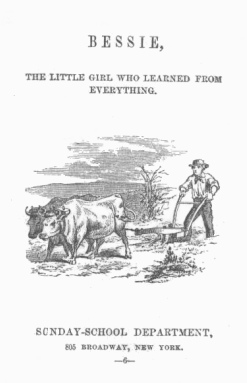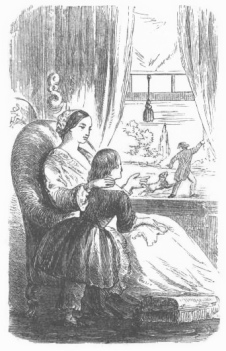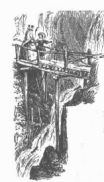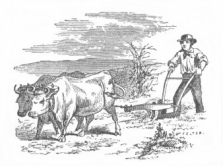 | |
 |   ESSIE, Mrs. Leslie's little daughter, came skipping into the parlor one morn- ing rather before the time for the daily lessons. She ran up to her mamma, who was sitting at work, and having kissed her, said: "O mamma, I came down sooner this morning, because I want to ask you something. May I talk to you a little before I begin my lessons?" "What have you got to talk about that is so very interesting that you can- |
|
not wait till after lessons ?" asked Mrs. Leslie, smiling. "Why, you know, mamma, that old Mrs. Bell came to tea with nurse last night. You said she might ask her. And, do you know, she said, while she sat at tea with us, 'It does me so much good to see all the little dears,' (she always calls us little dears,) 'they behave so pretty, and are so good.' For though nurse often finds fault with us, Mrs. Bell always admires our behavior." " And is that all you have to tell me ? there is nothing very wonderful in that." "O no," said Bessie.; "I shall soon come to it, if you will let me go on. She said: 'Nurse, I always learn so much from seeing these children. I shall think about them when I am sit- ting alone at home, and feel quite the better for it.' I laughed when she said | so, and I said: ' O Mrs. Bell, how can you learn anything from us? you are such a very, very old lady, and we are only very, very silly little children!' Then she smiled and said: 'Ah! Miss Bessie, I can learn something from every- thing I see, and so may you if you will try.' I told nurse, when Mrs. Bell was gone, I was sure what she said was not true, and she told me I had better ask you. Now, mamma, is it true ? Can I learn from everything?" "Well, dear, I think Mrs. Bell was right. I am sure, if we were to try, we might gain some useful lesson from everything we see. But I hardly can expect a little girl like you to enter into the meaning of such a thought." " I want to understand it very much indeed," said Bessie. Don't you think, dear mamma, you could make it plain |
|
to me? Why, if I could learn from everything, I might be always learning, because, you know, I am always seeing something, except when I am asleep." " I will try, dear," said mamma; " but, first, you had better do your lessons." " Do talk about it first, mamma," said the child. " I shall be thinking of it all the while I am reading, and I can- not do anything well if I am thinking of something else. You know you said so yourself yesterday." " No, my dear, the lessons must come first." Still Bessie pleaded for her own way; whereupon her mamma, looking toward the window, called to her to come and see what was passing. Just then a man threw a stick he had in his hand to some distance, and ordered his dog to fetch it; the animal |
obeyed. This was repeated several times. At last the man walked out of sight, followed by his faithful dog. " There is nothing wonderful in that," said Bessie. " Our Tray will do the same thing when Richard sets him to do it." " I did not tell you to look at that dog because it was doing anything wonder- ful," said mamma, " but because it was an opportunity of learning something. " Why, mamma!" said Bessie, laugh- ing " how could I learn from a dog ? I cannot carry a stick in my month." " True, my dear. But there was something the dog did which you can do. Try and find it out." " Do tell me what you mean, mamma; it is so tiresome to try to guess it." " The dog obeyed and obeyed instant- ly" said Mrs. Leslie. " That was the les- son you might have learned from him." |
|
Bessie colored up to her ears; then she said: " Well, I will learn it, mamma." And she ran and got her books, and went to her lessons at once. She applied very closely, and did them all very nicely, so that her mother was able to praise her. When they were finished she ran to the nursery, to be dressed for a walk with her mother. " Now, mamma," said she, as they walked along, "will you let me try to see whether I can find out what I may learn from everything we see as we walk along?" " That will be a good plan," said mamma. Their way led them through the high- road, across fields, and down a charm- ing lane. They also had to cross the river by a rustic bridge. Then they were to go into the village. |
As they walked, Bessie chatted away. " There are some birds sitting on a tree; well, I cannot learn anything from them. And these sheep, I cannot see what they can teach me, poor silly things! O look how they are running! What can be the matter ? Ah, I see ; there is a dog worrying them. I am afraid I shall not see anything I can learn there. O there is old Master Sutton! Well, I am sure I cannot learn from him, he is so stupid and ignorant. I wish I had got a cent to give him, poor fellow! Can you lend me one, mamma ? I will pay you the very minute we get home." The mother gave her a cent, and she ran with great kindness to give it to the poor man, who was half an idiot, but very harmless. When she returned, Mrs. Leslie said, " So you cannot learn anything from poor Master Sutton ?" |
|
" Why no, mamma," said Bessie, with very great surprise; " he knows noth- ing ; how could he teach me anything ?" " Well, my child," said Mrs. Leslie, "he teaches me to he thankful to God, that I am not a poor half idiot, like that poor man. Now you may learn the same lesson." Bessie looked very serious. "Dear mamma, I never thought of that. I never thought how good God was to me, in making me able to know better than poor Sutton. I will try and re- member what you have said every time I see him." " I hope you will, my dear. God has been very good to you." By this time they had come to a field, which a man was plowing with a yoke of oxen. "How stupid," said Bessie, "these |

poor oxen look. Horses are much pret- tier than oxen. Can I learn anything from them ?" " I want you to find out for yourself," said her mother. "They look very dull," said Bessie. " You do not wish me to learn to be sad. But they are also very industrious. All! that is the thing: I can learn from them to be industrious. That will be a very good lesson. And I have thought of an- |
|
other thing; they are very patient. I may learn to be patient. You know that is a very good thing. You some- times say I want patience very much." "You do indeed," said mamma, laugh- ing. As they were now in the high-road, they were rather annoyed by the dust, of which Bessie complained. " This is a good time to put in prac- tice the lesson you learned just now from the poor oxen," said mamma. Bessie, being in a very happy temper, laughed and said it would be, and said no more of the dust. When they came to the entrance of the village, they met a poor boy walking on crutches, he having lost one leg. As soon as Bessie saw him, she said to her mamma: " Look at poor James Hill; is it not a shocking thing that he was |
obliged to have his leg cut off? O , I could never, never have borne it." "Do you know how it was that he was obliged to lose it?" said mamma. " O yes, nurse told me all about it. He would ride after the hounds, though his papa had told him not to do so; and the pony fell, and hurt him so much that the doctors were obliged to cut off his leg, or he would have died. How sorry he must be now that he did not mind what his papa said. I must not learn from him, because it was so wicked. O yes, I see what you are thinking, mam- ma," said she, as she looked up in her mother's face; " I can learn from him, too; I can learn what a dangerous thing it is to be disobedient." " Yes, my love; and I pray God that the lesson may sink deep in your heart." They had now come to the cottage |
| they were to call at; and on going in Bessie felt very much disgusted at its untidy, dirty appearance. Her mother did not make her visit long, and they were both glad to get oat of the wretched place. As they walked to the next house they were going to, Bessie said: "How very poor these people must be whom you have just been to see. Why did you not give them some money, mamma ?" " What makes you think them so very poor, my dear ?" " Why, it was such a very dirty place, and the woman and children were all in rags," said Bessie. " They are not so poor as many very clean and tidy people. The man earns good wages: I did not give them mon- ey, as they would only waste it. I car- | ried the tart for the sick child, because its appetite is bad, and it longs for such things. It would be no charity else." On coming out of the next cottage Bessie expressed her delight at its clean, neat appearance, and said how beautiful old Mrs. Carter looked in her white cap and apron, which looked as if they had just been put on. " I cannot think she is so poor as the others, mamma." " But she is a great deal poorer, I can assure you, my dear," said Mrs Leslie. " What makes her look so comfortable is her neatness and industry." "Well," said Bessie, "I will learn from her to be very neat and careful of my things. I cannot learn anything from those other dirty people." "Yes, you can, my child," said her mother. "You may see in them the evil effects of untidy, wasteful habits,. |
| and so be taught to avoid them. Yon sometimes grumble when nurse insists upon your putting your things away carefully; or when I reprove you for spoiling your clothes. When you are tempted to be vexed again at these things, think of Atkins's cottage, and be afraid of becoming like them." "I should like to be good, always good," said Bessie; " but I can't. It is so hard, so very hard, never to do any- thing naughty. "True, dear; but the Bible tells us how we may become good. It tells us that our kind Saviour will give us his Holy Spirit to help us to be good." Bessie did ask the Saviour, and he gave her power to be good. |